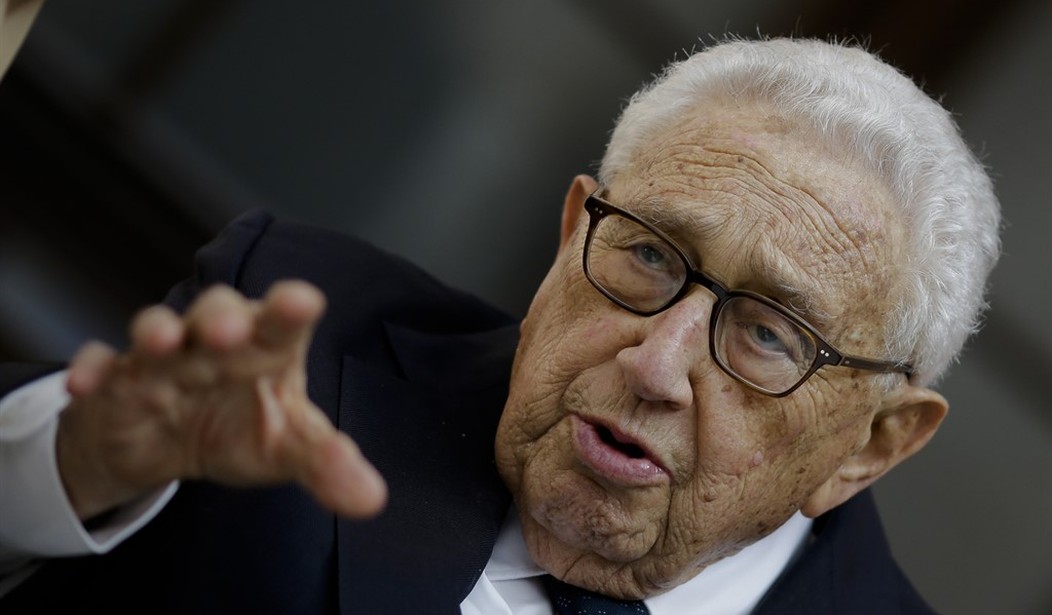Claremont Review of Books, the intellectual nerve center of the conservative world, graciously has unlocked its paywall to allow you to read my new review-essay on Henry Kissinger. It dissects the delusions of the foreign policy establishment and explains why Ronald Reagan–the self-taught foreign-policy amateur ridiculed by the experts–won the Cold War while his opponents clung to the sinking stone of detente with the Soviet Union. “Here’s my strategy on the Cold War. We win, they lose,” Reagan said at a time when the establishment claimed that winning was impossible.
You can read the essay at this link. And please subscribe to CRB. It’s the only conservation publication I read cover-to-cover, full of brilliant work by friends like Angelo Codevilla, Michael Anton, and John O’Sullivan (to name just a few in the current issue).
Another outsider, Donald Trump, confounded the serried ranks of foreign policy experts with a Middle East deal that was supposed to be impossible. Arab governments, the establishment insisted for decades, couldn’t have peace with Israel unless Israel agreed to a Palestinian State. The Palestinians didn’t want a state unless Israel agreed to commit suicide by allowing the children, grandchildren and great-grandchildren of the Arab refugees of 1948 to resettle in Israel. That was baloney. Trump told the Gulf monarchies that there wouldn’t be American boots on the ground to protect them, and they had to find other ways to fend off predators like Iran and the Turkish-backed Muslim Brotherhood. So the United Arab Emirates, Bahrain, and now Sudan have struck a deal with Israel.
Trump Makes History in the Middle East Yet Again With Another Israel Peace Deal
The self-delusion of the establishment explains the extraordinary career of Henry Kissinger, supposedly the greatest diplomatic genius the world has ever known, still regarded as the next best thing to the Delphic Oracle by the establishment press.
To win the Cold War America first had to show it could win a hot war. The Israeli air force’s decimation in 1973 by a Russian-armed Arab coalition led Moscow to conclude it could win a conventional war in Europe. Subsequent Soviet aggression reflected this confidence. But by the 1980s American technological advances and President Ronald Reagan’s determination to defeat the Soviets steadily turned the tables.
In 1982 U.S.-backed Israelis destroyed the Russian-built Syrian air force. A year later America’s deployment of Pershing II missiles and Reagan’s announcement of the Strategic Defense Initiative convinced Moscow it could not defeat NATO. The Communist empire collapsed before the decade was through. Reagan defeated the Soviets despite the open hostility of America’s foreign policy establishment and the reluctance of a fair part of his own cabinet.
The reigning academic wisdom, informed by game theory, thought winning impossible. Players with roughly equal forces could only annihilate each other or reach a détente. The establishment embraced this pseudo-scientific mathematicised nuclear strategy and its concomitant shibboleths: flexible response, limited nuclear war, counter value versus counter force targeting, strategic arms limitation, and so forth. The Soviets humored their American counterparts—and prepared to win an actual war. Henry Kissinger was the primary architect of the establishment strategy.
Equal parts Doctor Strangelove and Professor Harold Hill, Kissinger sold his buncombe to eager buyers from the media, academia, and political elite. His reputation rose inversely with his accomplishments. Vanderbilt historian Thomas Schwartz’s new book, Henry Kissinger and American Power: A Political Biography, reports in painstaking detail the shambles Kissinger made of his most important initiatives. The sole exception— 1972’s opening to China—was Richard Nixon’s idea, and succeeded in spite of Kissinger’s opposition.
Everything he undertook— withdrawal from Vietnam, Strategic Arms Limitation Talks, 1971’s South Asia crisis, Arab-Israeli peace talks—turned out a dog’s breakfast. Never in the course of diplomacy was so much botched for so many by so few. North Vietnam humiliated the United States, Russia cheated on nuclear arms, and the Israelis and Arabs returned to war. But the establishment wanted reassurance about peace in our time, and Dr. Kissinger told them what they wanted to hear.
There’s a lesson for us today.
There is no lack of clarity about China’s ambition. Unlike Soviet Russia, which impoverished its people to build its military power, China produces butter as well as guns, and has boosted personal consumption eight-fold in the past 30 years. Its designs are not territorial but technological: it wants to dominate what Chinese planners call the Fourth Industrial Revolution and control the Eurasian continent through a combination of technology and infrastructure.
China’s leaders are connoisseurs of power, and little else. And power today is technology. The lesson we should learn from Kissinger’s failure and Reagan’s success is simple: America’s position in the world rests on technological superiority. Under Reagan the United States devoted 1.4% of GDP, or $300 billion a year in today’s dollars, to basic R&D, with an agenda directed by the Defense Department. We remade the world. Today the proportion is 0.6% of GDP, and even the most ambitious proposals circulating in Congress would restore only a small fraction of the difference.
We have a choice: return to Reagan’s winning approach or defer to China. With his remarkable longevity, Henry Kissinger might still be available to negotiate another American surrender.










Join the conversation as a VIP Member